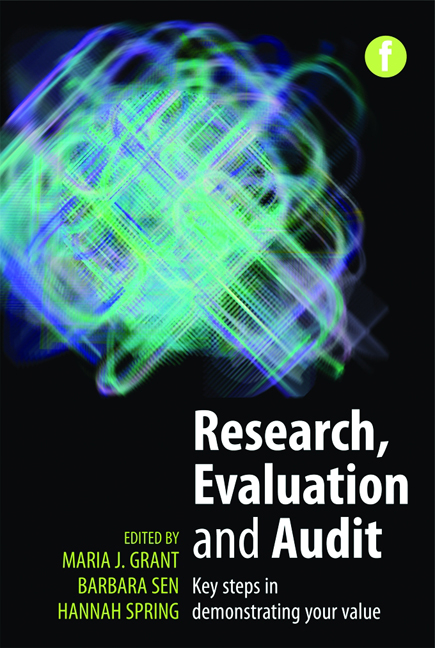Book contents
- Frontmatter
- Contents
- About the Editors
- Contributor
- Foreword
- Preface
- PART 1 GETTING STARTED
- PART 2 DOING RESEARCH, EVALUATION AND AUDIT
- PART 3 IMPACT OF RESEARCH, EVALUATION AND AUDIT
- 11 Writing up your project findings
- 12 Disseminating your project findings
- 13 What next? Applying your findings to practice
- Closing remarks
- Index
11 - Writing up your project findings
from PART 3 - IMPACT OF RESEARCH, EVALUATION AND AUDIT
Published online by Cambridge University Press: 08 June 2018
- Frontmatter
- Contents
- About the Editors
- Contributor
- Foreword
- Preface
- PART 1 GETTING STARTED
- PART 2 DOING RESEARCH, EVALUATION AND AUDIT
- PART 3 IMPACT OF RESEARCH, EVALUATION AND AUDIT
- 11 Writing up your project findings
- 12 Disseminating your project findings
- 13 What next? Applying your findings to practice
- Closing remarks
- Index
Summary
‘Writing is a luxury I don't have time for in my job!’
‘Is there anyone who can help me get started?’
‘How do I decide where to send my writing?’
Introduction
An integral part of completing a project, particularly one involving research or evaluation, is the process of reporting the work to the wider community. Becoming effective in writing research requires knowledge and skills that are transferable from the wide range of attributes and awareness already existing in the library and information science (LIS) practitioners’ skills portfolio. The purpose of this chapter is to provide an insight into aspects of writing to ensure that, as a writer, you become familiar with both the pleasures and challenges of writing. Strategies to overcome the challenges of writing are provided and the complex and varied motivations for writing are explored.
Motivation for writing
In some professions the culture, professional framework, job responsibilities and support structures are highly influential in motivating writing activity. While this is true for academic libraries in countries such as the USA and Nigeria, where tenure and financial gain are factors, in general extrinsic motivators are unusual within the LIS sector. As neither career progression nor a permanent contract are linked with writing output for most librarians, it is down to you as an individual to identify what motivates and influences your approach to writing.
Writing is often a primarily solo activity, and so it can be helpful to have an understanding of a range of factors identified in the literature that motivate others to write up their work (Bradley, 2008; Clapton, 2010; Sullivan, 2011):
Provides an outlet for project findings: Having your work published enables you to share your ideas and findings with other LIS practitioners and helps inform their decisionmaking, strengthening and improving library services. The more project work that is written up the rate at which our available knowledge base, which we ourselves may wish to draw on, will continue to grow.
Boosts individual's reputation: By contributing to the knowledge base, your writing portfolio can contribute to your professional progression. It provides the opportunity to raise your personal profile within your own organization and the wider LIS community and demonstrates that you have a range of skills that can be used in different settings. Very often further opportunities arise that can be directly attributed to specific items of professional writing.
- Type
- Chapter
- Information
- Research, Evaluation and AuditKey steps in demonstrating your value, pp. 191 - 202Publisher: FacetPrint publication year: 2013



